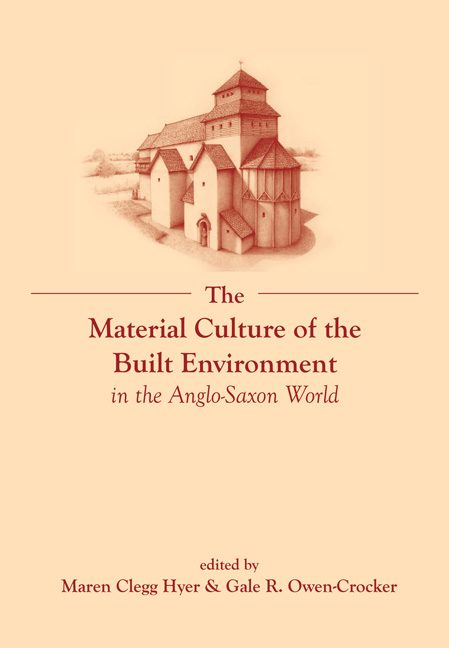Book contents
- Frontmatter
- Dedication
- Contents
- List of Figures
- List of Tables
- List of Contributors
- Introduction
- 1 Enta geweorc: The Ruin and its Contexts Reconsidered
- 2 Roads and Tracks in Anglo-Saxon England
- 3 Domestic Dwellings, Workshops and Working Buildings
- 4 Place and Power: Meetings between Kings in Early Anglo-Saxon England
- 5 The Cuckoo and the Magpie: The Building Culture of the Anglo-Saxon Church
- 6 Landmarks of Faith: Crosses and other Free-standing Stones
- 7 Landmarks of the Dead: Exploring Anglo-Saxon Mortuary Geographies
- 8 Boundaries and Walls
- 9 The Landscape of Late Saxon Burhs and the Politics of Urban Foundation
- 10 Signalling Intent: Beacons, Lookouts and Military Communications
- Notes
- Suggested Reading
- Index
1 - Enta geweorc: The Ruin and its Contexts Reconsidered
- Frontmatter
- Dedication
- Contents
- List of Figures
- List of Tables
- List of Contributors
- Introduction
- 1 Enta geweorc: The Ruin and its Contexts Reconsidered
- 2 Roads and Tracks in Anglo-Saxon England
- 3 Domestic Dwellings, Workshops and Working Buildings
- 4 Place and Power: Meetings between Kings in Early Anglo-Saxon England
- 5 The Cuckoo and the Magpie: The Building Culture of the Anglo-Saxon Church
- 6 Landmarks of Faith: Crosses and other Free-standing Stones
- 7 Landmarks of the Dead: Exploring Anglo-Saxon Mortuary Geographies
- 8 Boundaries and Walls
- 9 The Landscape of Late Saxon Burhs and the Politics of Urban Foundation
- 10 Signalling Intent: Beacons, Lookouts and Military Communications
- Notes
- Suggested Reading
- Index
Summary
Wratlic is tes wealstan, wyrde gebracon;
burgstede burston, brosnad enta geweorc.
The Ruin, ll. 1–2Splendid this stone wall is, though fate destroyed it, the stronghold fell apart, the works of giants crumble.
Introduction
The Old English poem The Ruin expresses a variety of feelings about the remains of Romano-British buildings which could be encountered in the landscape during the early medieval period. These achievements of the ‘giants of the past’ invoke a sense of awe and admiration, coupled with regret; the detail in the description of the buildings is typified by a sense of wonder which implies that they are in some way outside the writer's own usual socioeconomic context. This study examines the views expressed in the poem in the context of some other evidence from historical and archaeological sources, focusing on a range of locations: Winchester and its immediate environs; Wroxeter, on the borders of Anglo-Saxon (Mercian) and Welsh territories; and Wearmouth-Jarrow, in the context of the Hadrian's Wall frontier. Archaeological evidence points to a variety of ways in which Anglo-Saxons related to the sub-Roman remains which they could encounter in the landscape at various periods. This evidence enables us to suggest a historical context in which different expressions about such remains could develop, and further points to contrasts between the poetic expression of The Ruin and actual practice in Anglo-Saxon society from the eighth century onwards.
Textual tradition
‘The Ruin is an Old English poem whose mystery may never be solved, and which will always be difficult to translate’. This comment by R.F.S. Hamer encapsulates the two main issues which have been the focus of discussion and comment by specialists in Old English since the publication of a definitive text and commentary by R.F. Leslie in 1961. Sîan Eckhard likewise notes that her ‘working translation … is suggestive (even speculative) rather than definitive’. The Ruin is the final poem in The Exeter Book, and as such it received more damage from the fire which caused such injury to the volume than texts which precede it. Hamer goes on to note William Johnson's view that ‘some of the difficulty in translating is caused by the “largely unique” language’ in The Ruin, and Christopher Abram notes, with interesting comparisons set out in tables, the peculiarities of both vocabulary and syntax of the poem, together with its idiosyncratic quirks of poetic style.
- Type
- Chapter
- Information
- Publisher: Liverpool University PressPrint publication year: 2015



